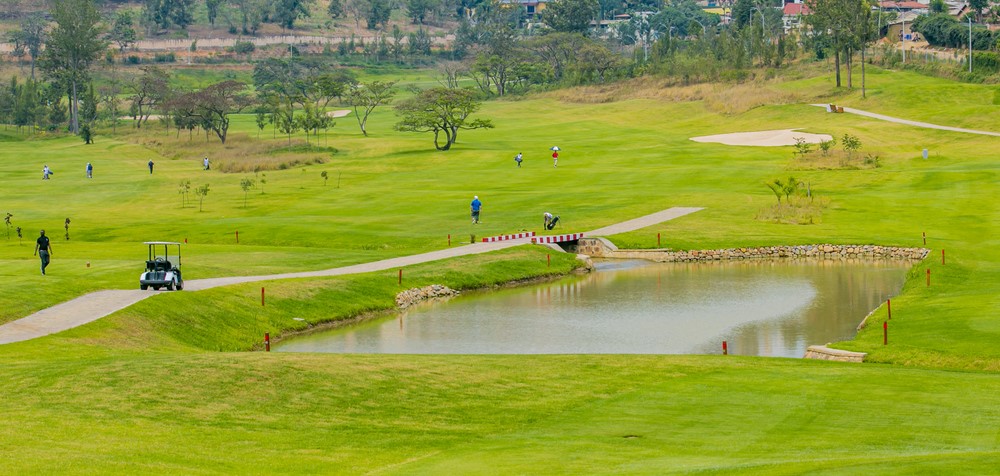Over the past 15 years, golf has emerged as one of Rwanda’s fastest-growing sports, garnering increasing attention through corporate tournaments and sponsorships. This sport, once a niche activity in the country, now has the potential to elevate Rwanda’s presence on the global stage by hosting PGA-standard tournaments. More than just a game, golf in Rwanda is becoming a symbol of the nation’s aspirations in tourism, sports, and economic development.
In collaboration with the private sector, the Rwandan government has made significant investments in golf, recognizing its potential to tap into the lucrative global golf tourism market, valued at a staggering $44 billion. These investments have already started to pay off, positioning Rwanda as an attractive destination for high-end golf tourism.
Rwanda’s premier golf courses, though few, are world-class. The Kigali Golf Resort & Villas, a multimillion-dollar 18-hole course, and the 9-hole Falcon Golf Club, a scenic waterfront course in Rwamagana district, offer golfers a luxury experience. The Kigali Golf Resort alone, with investments worth Rwf17.7 billion as of 2021, has become a cornerstone of the country’s golfing landscape.
This premier golf course has not only transformed Rwanda’s sports scene but also catalyzed economic development in the surrounding area. Nyarutarama, a high-end suburb of Kigali, has seen a surge of new hotels, resorts, and luxury apartments around the course, creating a booming real estate market. Investors are now eyeing the future of golf tourism in Rwanda, anticipating major events and international guests.
Golf’s Role in Rwanda’s Development
Golf tourism has become a significant player in Rwanda’s post-liberation economic and social transformation. The establishment of luxury golf courses has brought an influx of businesses, including hotels and apartments, which have sprouted up around the courses. These developments have been crucial in boosting the nation’s tourism sector and creating new opportunities for local entrepreneurs.
Corporate sponsorship has also followed the rising popularity of golf. While early sponsors included Cimerwa and MTN Golf, today the sport attracts big names such as Turkish Airlines, Bank of Kigali, and NCBA Bank Rwanda PLC. These companies now sponsor an array of annual tournaments, from the Visit Rwanda Golf Challenge to the Women’s Day Tournament and the National Golf Open.
For these corporations, golf is more than just a sport—it is an avenue for promoting their brands, engaging with high-value customers, and fulfilling corporate social responsibility goals. Diana Mukunde, Head of Business at NCBA Rwanda, says the bank is committed to advancing sports while contributing to Rwanda’s economic growth. “We are excited to launch the NCBA Golf Series, which demonstrates our dedication to fostering Rwanda’s sports development,” she said at the series’ launch in August.
Bank of Kigali has also taken an active role in sponsoring golf, seeking to connect with the corporate community and promote the Kigali Golf Resort. “Golf represents what we believe in: finance, elegance, and intelligence. We believe it will only grow stronger in the coming years,” said Levi Gasangwa, Chief Commercial Officer at the bank, during a recent tournament.
Regional Attention and International Tournaments
Golf’s appeal is not limited to Rwanda alone. The new Kigali Golf Resort & Villas has captured the attention of neighboring East African countries, where golfers and tourists alike have heard of the course’s high-end facilities and professional management. In fact, the course will host the fifth edition of the Africa Region IV Golf Championship in October 2024. Teams from Rwanda, Kenya, Uganda, Burundi, Tanzania, DR Congo, and Seychelles will compete in this prestigious event, further solidifying Rwanda’s position on the regional golf map.
The Impact on Local Communities
This rise in golf has also positively affected local communities, particularly among the caddies who assist golfers on the course. Once a disorganized group of young people, the caddies have since been professionalized under the management of the Rwanda Ultimate Golf Company (UGOLF). Today, 160 caddies work at the Kigali Golf Resort, with 60% being women, earning a daily wage that has increased from Rwf5,000 to Rwf7,000. As part of ongoing negotiations, they hope to raise this to Rwf10,000.
The Kigali Golf Course Caddie Master, John Bazatsinda, noted the improved working conditions and professional appearance of the caddies, who now work in a 7-star club environment. “Our standard is an EAC benchmark, but it’s also about promoting tourism. We are planning new uniforms for the upcoming regional game,” Bazatsinda added.
The Future of Golf in Rwanda
Looking ahead, the Rwanda Golf Union is committed to promoting golf not just as a sport, but as a key contributor to the nation’s tourism and capacity-building efforts. The union encourages stakeholders to align their goals with the government’s vision of sports and tourism development.
While Rwanda has produced a few local golfers, including Felix Dusabe—winner of the 2024 NCBA Mt. Kenya Championship—the challenge remains to increase local community participation in the sport. Despite the existence of a children’s golf academy, cultivating homegrown talent continues to be a priority. Neighboring countries like Uganda have demonstrated the value of nurturing talent from an early age, with players like the Saadi Onito family becoming golf legends.
Rwanda’s commitment to developing golf as a premier sport and tourism attraction signals a bright future. With strong corporate backing, luxury infrastructure, and a growing local community, the country is poised to become a major player in the global golf tourism market.

